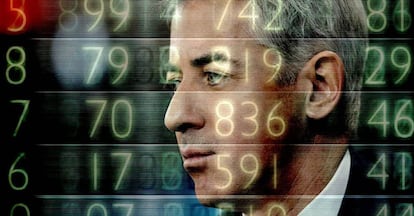Betting on zero: the documentary that exposes the Herbalife scheme
Film explores how the controversial nutrition company focuses on Latino immigrants in the US

Julio Ulloa, a native of Ecuador, had a construction business in the US that was doing very well. Then, one day in 2012, a representative from the nutrition company Herbalife knocked on his door and offered him the opportunity to increase his revenues. Ulloa was told that by commercializing nutritional supplements he could earn between $20,000 and $80,000 a month.

So he switched from construction to a nutrition club that promoted the Herbalife brand, and bought products worth thousands of dollars. “My provider used to tell me: the more you spend, the more you make.”
But the months went by, the diet products did not sell, and Ulloa’s debt kept mounting. At last, the unavoidable truth hit him in the face: his American dream of easy money was nothing more than an illusion.
Ulloa says that his “dreams were stolen.” Like him, there are hundreds of thousands of Latinos who lost between $8,000 and $22,000 in the US after investing in Herbalife products. A documentary called Betting on zero, by Ted Braun, explores these stories as well as the personal crusade by billionaire hedge fund manager Bill Ackman to expose Herbalife’s business model as the biggest pyramid scheme in history.
The months went by, the diet products did not sell, and Ulloa’s debt kept mounting
In the middle of the crossfire, the Latino community’s stories paint a picture of an American dream without a happy ending. “It was a chance to find out the place of money in the so-called American dream through a lens that reflects corporate conflict,” said the filmmaker in a telephone conversation. “It is a story with ramifications in the entire world and which connects with the lives of ordinary citizens.”
Braun said it was difficult to string together the different parts of the story, especially since Herbalife refused to participate in the documentary. That space was filled with archival footage of Herbalife officials instead, and complemented with testimony by former distributors who explain how multi-level marketing corporations work.
“It became an obligation to make the audience walk around in the shoes of a lot of people involved in these complicated conflicts,” said Braun. “It was very important to me for them to see and understand the view of the Herbalife distributors and executives.”
The finished work was nominated for Best Documentary Feature at the 2016 Tribeca Film Festival, and was not without its controversy. Braun reports that Herbalife boycotted a screening of the film at the National Portrait Gallery in Washington DC in October, by getting a lawyer named Heather Podesta and her partners to purchase 173 tickets, representing half of seats at the screening room, and then leaving the seats empty.
The Latino community’s stories paint a picture of an American dream without a happy ending
This and other attacks did not prevent Betting on zero from becoming the most-watched documentary on iTunes for the first three weeks since its release in April of this year. It is now also currently available on Netflix.
The documentary accuses Herbalife of focusing on the immigrant community and of exporting its business model to developing countries. A Latina activist named Julia Contreras who appears in the movie and a group of former distributors were intimidated by Herbalife sympathizers, who threatened to have them deported if they continued to attack the company’s name.
According to Braun, many of the complaints filed by Contreras and her group were taken into account by a Federal Trade Commission (FTC) investigation into Herbalife that concluded that the company incurred in deceptive practices. Herbalife paid $200 million to settle with the regulator and agreed to restructure its business model.
“At all times we maintained our independence,” said Braun. “We worked hard to deliver a project that is not just advocacy, and which invites everyone to understand the entire situation.”
English version by Susana Urra.
Tu suscripción se está usando en otro dispositivo
¿Quieres añadir otro usuario a tu suscripción?
Si continúas leyendo en este dispositivo, no se podrá leer en el otro.
FlechaTu suscripción se está usando en otro dispositivo y solo puedes acceder a EL PAÍS desde un dispositivo a la vez.
Si quieres compartir tu cuenta, cambia tu suscripción a la modalidad Premium, así podrás añadir otro usuario. Cada uno accederá con su propia cuenta de email, lo que os permitirá personalizar vuestra experiencia en EL PAÍS.
¿Tienes una suscripción de empresa? Accede aquí para contratar más cuentas.
En el caso de no saber quién está usando tu cuenta, te recomendamos cambiar tu contraseña aquí.
Si decides continuar compartiendo tu cuenta, este mensaje se mostrará en tu dispositivo y en el de la otra persona que está usando tu cuenta de forma indefinida, afectando a tu experiencia de lectura. Puedes consultar aquí los términos y condiciones de la suscripción digital.








































